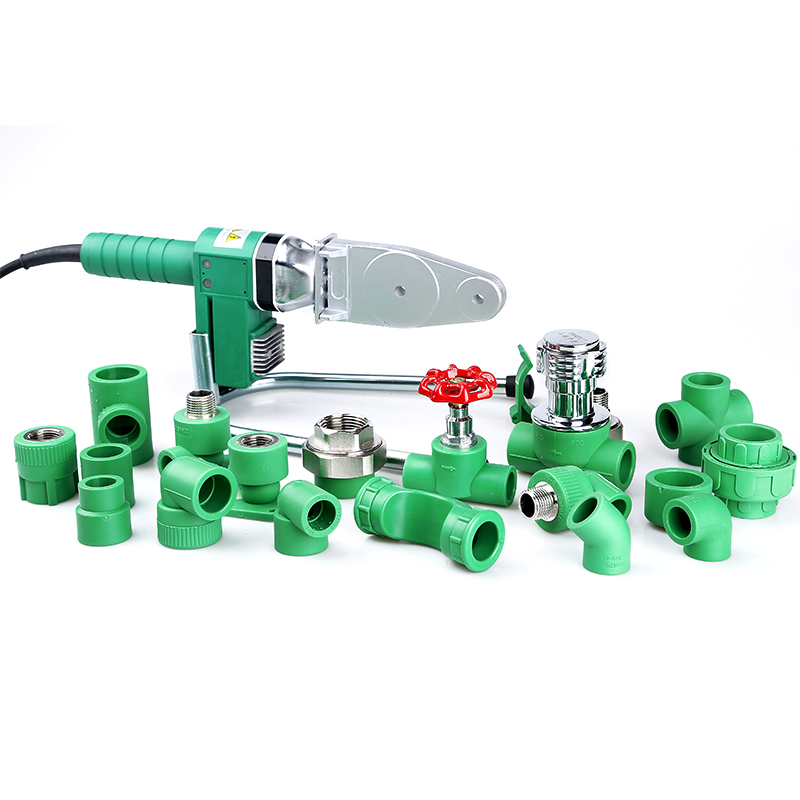PPR Fittings have excellent corrosion resistance and chemical resistance, which makes them widely used in water supply, HVAC, air conditioning and other systems. PPR pipe fittings outperform traditional metal pipes in many areas, especially in terms of corrosion resistance and chemical resistance. It has the following significant advantages:
Corrosion resistance
The corrosion resistance of PPR pipe fittings is one of its most significant advantages. Because polypropylene itself has strong chemical corrosion resistance, PPR pipe fittings will not be corroded by most corrosive substances in water (such as acids, alkalis, salts, etc.) during use.
Anti-corrosion in water: PPR pipe fittings are not affected by ordinary water corrosion (such as soft water, hard water, etc.). Compared with metal pipes (such as steel pipes and cast iron pipes), PPR pipe fittings will not rust, rot or rust, which greatly extends the service life of the pipe and reduces maintenance costs.
Resistant to chemical corrosion: PPR pipe fittings are highly resistant to corrosion by most chemical substances. For example, it can withstand the erosion of chemical substances such as weak acids and alkalis, and is not easily corroded by harmful substances in water (such as chlorine, sulfides, oxides, etc.). Even in some industrial environments, PPR pipe fittings can maintain their structural stability.
Prevent microbial corrosion: Metal pipes are often corroded by microorganisms (such as bacteria, algae, etc.), leading to pipe blockage and water pollution. PPR pipe fittings avoid this problem because of their smooth inner surface, which is not easy to breed bacteria and algae.
chemical resistance
The chemical resistance of PPR pipe fittings is mainly reflected in its resistance to corrosion by a variety of chemicals, including acids, alkalis, salts and other common chemicals. Polypropylene material has good chemical stability, so PPR pipe fittings can withstand a certain range of chemical attack in some special applications, such as chemical industry, food processing and other industries.
Resistance to acid and alkali corrosion: PPR pipe fittings can show excellent resistance to chemical corrosion in both acidic and alkaline environments. For example, it can withstand the influence of weak acids (such as acetic acid, hydrochloric acid) and weak bases (such as sodium hydroxide solution), and is widely used in industrial wastewater discharge and acid-base material transmission systems.
Salt resistance: PPR pipe fittings have good resistance to salt water corrosion. When used in seawater or water with high salt content, PPR pipe fittings will not rust or corrode like metal pipes, so they are very suitable for use in oceans, seaside and other environments.

Resistant to organic solvents: PPR pipe fittings may be exposed to organic solvents (such as alcohol, alcohols, oils, etc.) in some industrial applications. Although PPR pipe fittings have good resistance to most organic solvents, some strong solvents (such as ketones, aromatic hydrocarbons, etc.) may have a certain impact on them. In these cases, pipe selection should be done with caution and suitability confirmed with specialist suppliers if necessary.
Long term corrosion resistance
The corrosion resistance of PPR pipe fittings is very reliable in long-term use. Due to the high stability of polypropylene materials, PPR pipe fittings will not deteriorate in performance over time. Traditional metal pipes (such as steel pipes and stainless steel pipes) may rust and corrode due to external environment, climate change or chemical reactions, resulting in reduced pipe strength and water leakage problems. PPR pipe fittings have significant durability under the same environment and can work stably for a long time.
Long-term use: PPR pipe fittings will not be affected by corrosive substances during long-term use, thereby ensuring the structural stability of the pipeline and smooth water flow. This is particularly important for drinking water pipes, heating pipes and other systems that have high water quality requirements.
Adapt to different water quality environments
PPR pipe fittings can adapt to a variety of water conditions, including hard and soft water. Hard water usually contains more minerals (such as calcium, magnesium and other ions). These minerals may cause corrosion or sediment accumulation on traditional pipes (such as steel pipes), but PPR pipe fittings can maintain good corrosion resistance. Corrosive ions (such as carbon dioxide, acidic substances, etc.) in soft water also have less impact on PPR pipe fittings, ensuring the stability of the pipeline in different water quality environments.
The corrosion resistance and chemical resistance of PPR pipe fittings are one of its most outstanding advantages. It has excellent water corrosion resistance, chemical corrosion resistance and stability to a variety of chemical substances. It can effectively resist the erosion of common chemical substances such as acids, alkalis, and salts, ensuring that it can work stably in a variety of environments for a long time.

 简体中文
简体中文 English
English русский
русский Español
Español Français
Français عربى
عربى Português
Português












